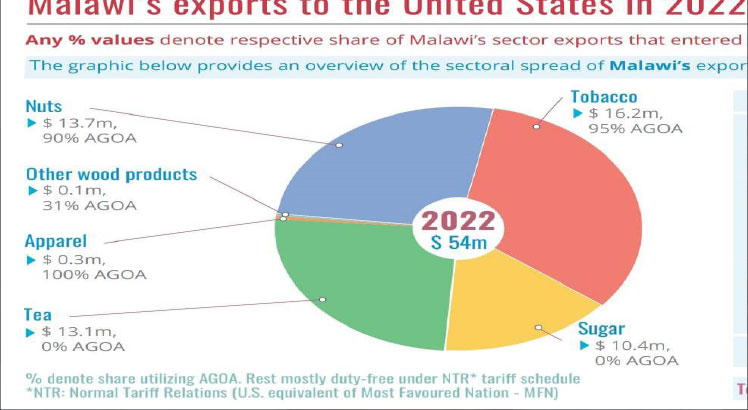Malawi strategises on AGOA extension
Malawi is strategising on how to benefit more from the African Growth and Opportunity Act (Agoa) ahead of its possible renew for an additional 16 years.
Agoa, a United States (US) Government trade window opened in 2000 to deepen trade ties with Africa and help African countries develop their economies, provides duty-free access to the US market and is due to expire in September 2025 after being renewed twice.
In a written response on Tuesday, Ministry of Trade and Industry spokesperson Patrick Botha said government expects that the commercialisation of agriculture, establishment of megafarms and Special Economic Zones will, among other initiatives, enhance Malawi’s capacity to increase exports under Agoa.

He said: “The extension of Agoa is good news for Malawi as we have been a beneficiary since its inception and our commodities such as tobacco, macadamia nuts, cane sugar, textiles and apparel have been enjoying duty free access to the USA Market.
“Malawi looks forward to the extension and more importantly we are strategising on how to improve our utilisation further.”
On Thursday, the US Foreign Relations Committee announced that US Senators Jim Risch and Chris Coons introduced the Agoa Act Renewal and Improvement Act of 2024 to extend the trade pact by 16 years, pushing back the programme’s expiration from 2025 to 2041.
The extension, according to the Bill, would provide businesses the certainty needed to invest in sub-Saharan Africa, supporting economic growth and development in the region.
This change would help support the development intra-African supply chains. To participate in the expanded rules of origin, North African countries would be required to meet Agoas’s eligibility requirements related to governance, human rights and foreign policy.
In a statement published on the US Foreign Relations Committee website, Coons is quoted as having said the Agoa Renewal and Improvement Act is necessary to support continued economic development on the continent while further strengthening ties between the United States and partners in sub-Saharan Africa
On his part, Risch said the bipartisan bill aims to refine Agoa’s eligibility criteria, increase transparency, and hold US agencies accountable for their advice to the president.
To maintain Agoa eligibility, countries are required to uphold several values that are core to free and fair societies such as rule of law, respect for human rights, combatting corruption and protecting workers’ rights.
Speaking separately, National Working Group on Trade and Policy chairperson Frederick Changaya said while the extension offers the country an export market, the opportunities may slide if Malawi doesn’t do “the right things”.
He said: “Agoa is above board trading, not many export markets can compare on this transfer pricing index to the USA market. So governmentt benefits trackability of export revenues for accountability on forex and also on tax liability.
“However, stakeholders need to play their part. Government should manage the fundamentals such that our cost of doing business and competitiveness is good enough to claim our fair share of the opportunity.”
Since Agoa’s inception in 2000, Malawi has exported goods worth $1.55 billion (about K2.5 trillion) to the US market, with $1.15 billion (about K1.96 trillion) qualifying for Agoa preferences, ranking 15 out of 35 countries in Africa that have most utilised the trade window over the past 23 years.
Malawi’s exports to the US comprise mostly agricultural products such as tobacco, sugar, tea and nuts.
Last year, Malawi joined other African countries to push for an early 10-year extension of Agoa trade window beyond 2025






w5ljqo